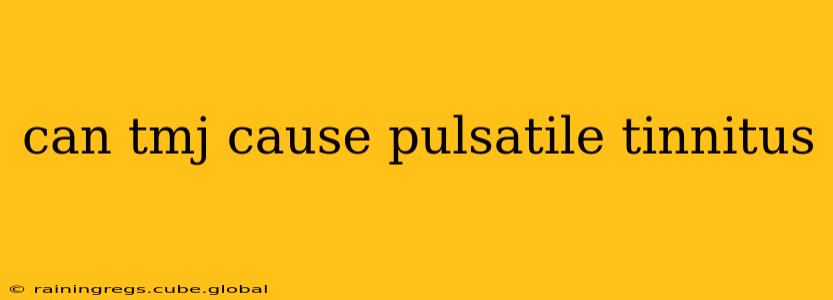Pulsatile tinnitus, that rhythmic whooshing, throbbing, or clicking sound synchronized with your heartbeat, can be a distressing symptom. While many factors can contribute to this condition, a question frequently arises: Can TMJ cause pulsatile tinnitus? The short answer is: possibly, but it's not a direct, guaranteed cause. The relationship is complex and often involves other contributing factors.
Let's delve deeper into understanding this potential link and address some common questions surrounding TMJ and pulsatile tinnitus.
What is TMJ?
Temporomandibular joint (TMJ) disorder refers to problems with the jaw joint and surrounding muscles. These problems can cause pain, clicking, popping, or locking in the jaw, headaches, and even earaches. The intricate network of nerves and blood vessels in this area means that dysfunction can manifest in unexpected ways.
What is Pulsatile Tinnitus?
Pulsatile tinnitus is the perception of a sound that seems to pulse in time with your heartbeat. Unlike the more common non-pulsatile tinnitus (a constant ringing, buzzing, or hissing), pulsatile tinnitus often has an identifiable source related to blood flow near the inner ear.
Can TMJ Cause Pulsatile Tinnitus? Exploring the Potential Link
While TMJ doesn't directly cause pulsatile tinnitus in most cases, it can contribute to its development or exacerbate existing symptoms. Here's how:
-
Vascular Compression: TMJ dysfunction can lead to changes in blood flow and pressure within the head and neck. This can involve compression of blood vessels near the inner ear, creating the pulsatile sound. The muscles surrounding the TMJ can tense and put pressure on arteries near the ear, potentially leading to the perceived pulsing.
-
Inflammation: Chronic TMJ problems often involve inflammation. This inflammation can affect blood vessels and nerves, altering their function and potentially contributing to pulsatile tinnitus.
-
Nerve Irritation: The trigeminal nerve, which innervates the face and jaw, is closely associated with the TMJ. Irritation or dysfunction of this nerve due to TMJ problems can sometimes lead to tinnitus.
-
Indirect Relationship: It's crucial to remember that TMJ is often linked to stress and tension. This stress can exacerbate other underlying conditions which could be the true cause of the pulsatile tinnitus.
How Common is This Connection?
Determining the precise prevalence of TMJ-related pulsatile tinnitus is difficult due to the multifaceted nature of both conditions. While TMJ dysfunction is relatively common, its connection to pulsatile tinnitus isn't consistently documented in large-scale studies. Many cases of pulsatile tinnitus have other underlying causes.
What Other Conditions Can Cause Pulsatile Tinnitus?
It's essential to consider other potential causes of pulsatile tinnitus, as TMJ is rarely the sole factor:
- High blood pressure: Increased blood pressure can increase blood flow near the inner ear.
- Aneurysms: Aneurysms (bulges in blood vessels) near the ear can create a pulsatile sound.
- Vascular malformations: Abnormal blood vessels near the inner ear.
- Glomus tumors: Rare tumors in the middle ear or jugular bulb.
- Otological conditions: Problems within the ear itself.
What Should I Do if I Suspect TMJ-Related Pulsatile Tinnitus?
If you experience pulsatile tinnitus and suspect a link to TMJ, it's crucial to consult a healthcare professional. A thorough evaluation is needed to determine the underlying cause. This will likely involve:
- Physical examination: A doctor will examine your jaw, ears, and neck.
- Imaging tests: Such as MRI or CT scans to rule out other causes like aneurysms.
- Audiological evaluation: To assess your hearing and pinpoint the nature of the tinnitus.
Can TMJ Treatment Help Pulsatile Tinnitus?
Treatment for TMJ-related pulsatile tinnitus usually focuses on managing the TMJ disorder itself. This may involve:
- Physical therapy: To improve jaw mobility and reduce muscle tension.
- Medication: Pain relievers, muscle relaxants, or anti-inflammatory drugs.
- Splints or mouthguards: To stabilize the jaw joint.
- Lifestyle changes: Stress management techniques and dietary adjustments.
Disclaimer: This information is for educational purposes only and does not constitute medical advice. Always consult a healthcare professional for diagnosis and treatment of any medical condition.
